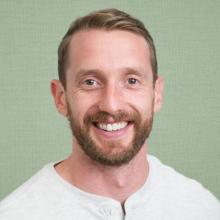Seeds of a Positive Change Revolution

It was early afternoon, and I was aimlessly wandering the expo hall in the Colorado Convention Center in an after-lunch daze with no plan, just soaking in the novelty and gravity of the event. Attending the first NAFSA conference since the pandemic, I was both overwhelmed with the experience and thrilled to be seeing friends and colleagues again after several long years of strictly virtual connections.
Unsure of my next move, I walked past the NAFSA Pavilion during a presentation about the NAFSA Academy for International Education. Two presenters were sharing the opportunity to volunteer as an Academy coach, and something one of them said caught my ear: “Academy coaching is an amazing way for you to make a positive impact on the field.” Hearing that stopped me dead in my tracks and turned me toward creating positive change. Something about those words touched a deep desire in me to take back an active role in creating a better world.
We are intimately familiar with the dramatic toll COVID-19 has had on our lives and on our field. From the point when the pandemic hit in March 2020 up to that moment in Denver, I felt like I was surviving, holding on by a thread, helping others keep their heads above water, reacting, just barely getting by. In May 2022, when I walked by the NAFSA Pavilion, I was longing for a chance to do more than just get by, to contribute something unique and significant that could inspire excellence in myself and others. The Academy could not only be a new avenue for me to hone my coaching skills but it could also reignite my sense of self as a generative contributor toward the lives of others in our field.
A Leadership Journey
I stepped into the role of NAFSA Academy coach for Region II at the beginning of 2023, and it has been a phenomenal experience. I’m so fortunate to have been matched with five outstanding trainees. Together we’ve created a strong, supportive, and fun cohort. Not only have I been able to support my trainees with their growth and professional development but I’ve also made amazing connections, developed valuable relational skills, and, most importantly, have consistently engaged with ways to make the work we do more sustainable, meaningful, and engaging. At the same time I started with the Academy, I began a master’s in positive organization development and change at Case Western Reserve University. My program’s primary focus is on leadership and how to lead sustained positive change with individuals, teams, and organizations through volatile and uncertain times.
It's evident that we’re living in an age where there are constant challenges, difficulties, and obstacles for us to overcome. The pace at which the world is changing around us is increasing at an exponential rate. It feels like every week another geopolitical event or technological innovation requires us to adapt, alter our approach, and respond. Yet our mission to facilitate global experiences and foster a kinder, more understanding, and more peaceful world remains the same. This tension requires us to fundamentally reexamine how we’re leading, organizing, interacting, and designing our workplaces to maximize our people’s strengths and connect them more meaningfully to the mission and impact of our work.
We are so fortunate to have colleagues in this field who care deeply and exhibit boundless curiosity and openness to the possibilities that exist in connecting across borders.
So many people are drawn to work in our field because they care deeply about our mission. Many of us have had meaningful personal experiences in international education that have fundamentally changed our lives for the better. We are so fortunate to have colleagues in this field who care deeply and exhibit boundless curiosity and openness to the possibilities that exist in connecting across borders. This passion is our most underutilized resource and is a well of generative energy that we must learn to tap into and cultivate in our organizations.
Becoming Agents of Change
Through my studies, I’ve seen the ways that leaders can intentionally introduce and cultivate “positive contagions” in their organizations. Work can contribute much-needed meaning to people’s lives if approached with that intention and the right tools and techniques. In a time when so many are asking, “How can we engage people?”, leaders must reflect on how they’re approaching their employees and work and whether they are creating the conditions for their staff to be engaged and thrive. If we want people to contribute their best, we need to create opportunities for genuine, meaningful inclusion and provide them with more decision-making power over their roles and contributions. Research shows there are ways to lead with compassion for your workers, resource efficiency, and an eye on meaningful results. It requires leaders to shift beyond either/or, black-and-white thinking and adopt a both/and expansive perspective.
The complexity and importance of the work we engage in requires leaders who can both inspire the best in those they lead and lead confidently from the front when crises occur.
My greatest hope for the future of our field is that we embrace the dynamic world we’re living in and adapt our approach to better respond to the uncertainty we can expect. The complexity and importance of the work we engage in requires leaders who can both inspire the best in those they lead and lead confidently from the front when crises occur. Skillful, resonant leadership is a prerequisite to us advocating for the changes to our systems that will allow us to properly respond in an increasingly unpredictable and changing landscape. As we look to the future, I hope we all take this approach in creating positive change around us in both small and big ways to ensure our field’s lasting impact on our future. •
John Hildebrand is the manager of international student advising services at Colorado State University and the NAFSA Academy coach for Region II.
About International Educator
International Educator is NAFSA’s flagship publication and has been published continually since 1990. As a record of the association and the field of international education, IE includes articles on a variety of topics, trends, and issues facing NAFSA members and their work.
From in-depth features to interviews with thought leaders and columns tailored to NAFSA’s knowledge communities, IE provides must-read context and analysis to those working around the globe to advance international education and exchange.
About NAFSA
NAFSA: Association of International Educators is the world's largest nonprofit association dedicated to international education and exchange. NAFSA serves the needs of more than 10,000 members and international educators worldwide at more than 3,500 institutions, in over 150 countries.
NAFSA membership provides you with unmatched access to best-in-class programs, critical updates, and resources to professionalize your practice. Members gain unrivaled opportunities to partner with experienced international education leaders.















